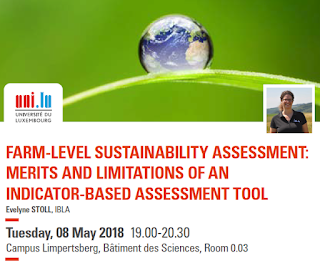When it comes to sustainability and sustainable development, food systems,especially at the farm level show great deficiencies. We are currently facing several environmental challenges, such as greenhouse gas emissions and climate change, soil erosion and soil degradation, biodiversity loss, and nitrogen and phosphorus cycles, on which food production can have substantial impacts. Socio-economic issues, such as poor labour conditions and financial viability of the farm, also play an important role with respect to the sustainability of food production. However, the question arises, what sustainable food production is. The Food and Agriculture Organization of the United Nations (FAO) has published the SAFA (Sustainability Assessment of Food and Agriculture Systems) Guidelines in an attempt to define sustainability in the food and agriculture systems and to provide a universal framework for the sustainability assessment of these sectors. The SAFA-Guidelines structure sustainability in 4 dimensions (Good Governance, Ecological Integrity, Economic Resilience, Social Wellbeing), 21 themes and 58 sub-themes. For each sub-theme, an absolute objective describes the target state of sustainability. The FiBL (Forschungsinstitut für Biologischen Landbau, the Research Institute of Organic Agriculture) has developed the SMART (Sustainability Monitoring and Assessment RouTine)-Farm Tool to operationalize the SAFA Guidelines: the tool models the sustainability of a farm with respect to the 58 SAFA sub-themes. This is an indicator based assessment of the level of goal achievement.
In this class, we will look at the possibilities of sustainability assessment in the food system, with focus on the indicator-based assessment using the SMART-Farm tool. We will discuss the benefits and limitations of such indicator-based assessments and will broach the challenge of defining internationally comparable indicators that are still applicable in diverse local conditions.
In this class, we will look at the possibilities of sustainability assessment in the food system, with focus on the indicator-based assessment using the SMART-Farm tool. We will discuss the benefits and limitations of such indicator-based assessments and will broach the challenge of defining internationally comparable indicators that are still applicable in diverse local conditions.
Evelyne Stoll (MRes) studied Environmental Sciences for her Bachelor in Science degree at the University of Aberdeen (UK) before attending the Heriot-Watt University in Edinburgh (UK) for her Master of Research in Environmental Analysis and Assessment. After her studies, she worked for INCOTEC Sweden AB in their testing facilities in Uppsala (S) before returning to Luxemburg. Since 2013, she works in the research and development department of IBLA and has been responsible, among other projects, for the winter cereal variety trials and the European Core Organic Project „COBRA“. More recently, the focus of her work was on the holistic sustainability assessment of agricultural holdings, namely using the SMART (Sustainability Monitoring and Assessment RouTine)-Farm Tool. This topic will be further deepened in the project “SustEATable – Integrated analysis of dietary patterns and agricultural practices for sustainable food systems in Luxembourg” (2018-2021).


No comments:
Post a Comment